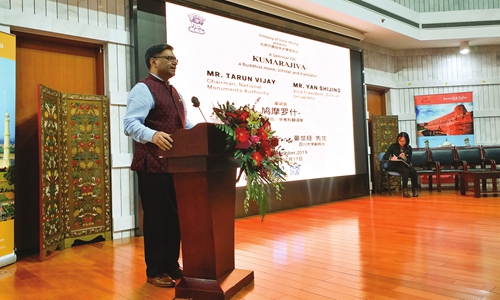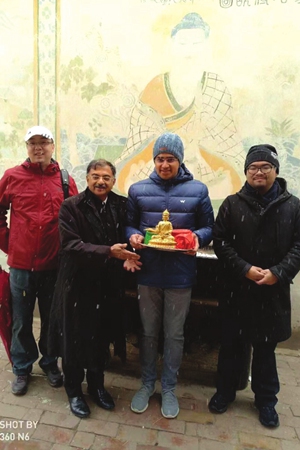Indian delegates’ quest to find cultural ties in China
By Shamim Zakaria Source:Global Times Published: 2019/11/20 16:46:31

Indian Ambassador to China Vikram Misri delivers the opening speech during a seminar on Buddhist monk and scholar Kumarajiva on Sunday at the Embassy of India in Beijing. Photo: Courtesy of the Embassy of India in Beijing

Tarun Vijay (second from left) and Tejasvi Surya (third from left) offer sacred soil and holy water from India to the White Horse Pagoda in Dunhuang, Northwest China's Gansu Province. Photo: Courtesy of the Embassy of India in Beijing
Sunday evening witnessed a vivid walk exploring the footprints of Chinese-Indian cultural ties through the kaleidoscope of the scholarly work of Buddhist monk and scholar Kumarajiva. Considered to be the doyen of India's ties with China, and vice versa, over the last 1,600 years, Kumarajiva has been revered for his translations of Buddhist texts from Sanskrit to Chinese. Kumarajiva hailed from the Kingdom of Kucha, an area in the present-day Aksu Prefecture in Northwest China's Xinjiang Uyghur Autonomous Region, born to a Kashmiri father and a Kuchan princess.
"I bow my head to the eminent Chinese scholars and hope to learn more from you on Kumarajiva and other Buddhist scholars," said Tarun Vijay, reverentially gesturing at Professor Yan Shijing of Sichuan University and research scholar Ge Weijun (formerly of the Chinese Academy of Social Sciences) and other distinguished Chinese scholars, setting the tone for an erudite symposium at the Swami Vivekananda Cultural Centre at the Embassy of India in Beijing. Both Yan and Ge threw light on the life and contributions of Kumarajiva to Buddhist learning in China.
'Who is Kumarajiva?'
From November 11 to Wednesday, Tarun, a former member of India's parliament and current chairman of India's National Monument Authority, Ministry of Culture, was in China on a quest to retrace the footsteps of Kumarajiva and the various Chinese historical monuments connected to the monk. In this tryst with history, Tarun was accompanied by Tejasvi Surya, member of Parliament, Lok Sabha (India's lower house). Assuming the position of a lawmaker at the age of 28, Tejasvi is the youngest parliamentarian of India's ruling party.
The duo embarked on their journey with the academic cooperation of the Center for South Asia-West China Cooperation and Development Studies at Sichuan University. With White Horse Pagoda in Dunhuang, Northwest China's Gansu Province, as their first stop, they went on to visit notable places such as Dunhuang's Mogao Caves, Caotang Temple in Xi'an, Northwest China's Shaanxi Province and the shrine of Kumarajiva in Xi'an where he breathed his last in 413.
"When I was first asked by Tarun to accompany him in the rediscovery of Kumarajiva, my obvious question was - 'who is Kumarajiva?'" said young Tejasvi, pensively reflecting on his experience.
"However, following this journey I have not only learned about Kumarajiva and China but also about my own culture and my own country," Tejesvi added, acknowledging that this journey, his first, helped him bust many fatuous misconceptions and prejudices about China.
Regarding Kumarajiva as his hero, Tarun said he draws inspiration from this great scholar to work toward harnessing a strong China-India friendship and cultural bond. Tarun added it was an "out of the world" sunrise that he witnessed in the midst of the Gobi desert a couple of years back that inspired him to start a thorough research on Kumarajiva, and he believes the magnificent soaring sun also symbolizes the rise of the Chinese people's quest for knowledge and spirituality.
According to scriptures, Kumarajiva was famed for his encyclopedic knowledge of Indian and Vedic learning, Hindu history and culture between 1,500 BC and 500 BC. He lived during the 4th-5th centuries, and apparently, it was largely due to his efforts and influences that Buddhist religious and philosophical ideas were disseminated in China. Kumarajiva personified the cultural connection which runs deep between the two ancient civilizations of India and China, and served as a bridge of friendship and knowledge between the two nations.
In the packed hall, as the audience sat spellbound listening to numerous fascinating tales of Kumarajiva from Tarun, he added that Kumarajiva's prolific work earned him the title "The National Teacher of China."
Cultural rejuvenation
After visiting various sites associated with Kumarajiva, both Tarun and Tejasvi lauded China's efforts to conserve its cultural heritage.
"Every time I come to China I realize how little I know about my next-door brother, besides there's so much India can learn from China's conservation efforts," said Tarun.
Meanwhile, Tejasvi was visibly inspired by the Chinese authorities' professionalism, and the "well-read" and "well-versed" virtues of the Chinese tour guides.
"Due credit must be given to the Chinese government for managing things in such an incredible way."
During their journey, Tarun along with Tejasvi also made a symbolic effort to connect the two countries spiritually. They brought "holy" Ganges water and soil from the Indian state of Varanasi, and handed it over to the head monk of the Kumarajiva Temple in Wuwei, Gansu Province. In return, the elated monk gifted them with reproduced versions of ancient lotus scriptures that are part of Kumarajiva's translations. Tarun promised that he would deliver these historic scriptures to the Indian prime minister. The monks also requested the India delegation to facilitate a "pilgrimage" of India. Tejasvi obliged on record that as a lawmaker he would make earnest efforts to institutionalize measures so that more young Indians can learn about Kumarajiva.
"I will press upon to institutionalize an Indo-China cultural tour to study the works of Kumarajiva, besides an award can also be initiated through joint efforts of both the government, in the name of Kumarajiva that can be conferred to those who work for cultural rejuvenation."
The Indian Ambassador to China Vikram Misri, who also graced the seminar, said this initiative comes at a significant time as India and China are preparing to celebrate the 70th anniversary of the establishment of diplomatic relations.
The final leg of the Kumarajiva journey saw the Indian delegation participate in a seminar at the Jinjiang College in Meishan, Sichuan Province, on Wednesday, where they shared their experiences in China.
Newspaper headline: Retracing history
Posted in: CULTURE & LEISURE